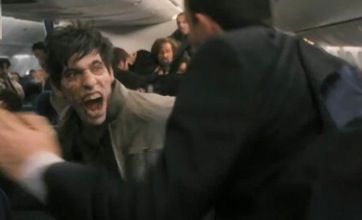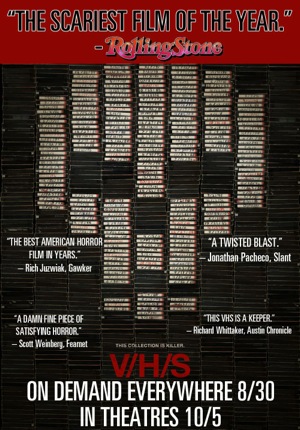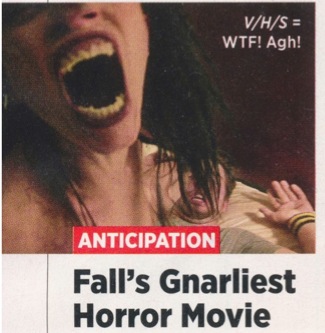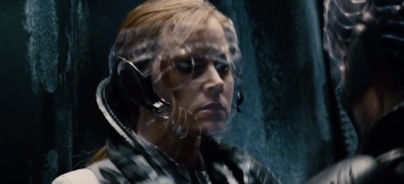Jun 2013
Pitt’s “World War Z” Reinvigorates the Zombie Genre
21/06/13 13:30 Filed in: Movie Review
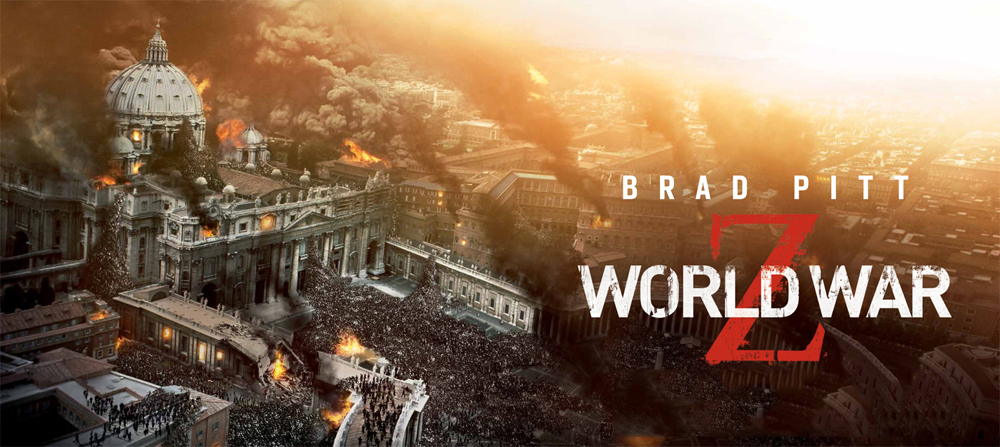
"World War Z" (WWZ) is one of those movies that is so well produced and directed, you may not notice how much it gets right, including a refreshingly vanity free performance by Brad Pitt. This film makes the "Resident Evil" franchise look like a flipbook by comparison.
WWZ jumps right into a zombie outbreak in Pitt's hometown of Philadelphia that is rapidly spreading across the globe. Not a moment is wasted with nonsense backstories no one cares about - before we know it, zombies are moving at lighting speed in ways we've never seen, overrunning the streets of Philly. Pitt's Gerry Lane is an ex-United Nations investigator whose family is only saved because the government needs him to help solve the pandemic.
Other reviews have noted that the "who, what, where and why" of the zombies isn't very well fleshed out in WWZ, and that's true. But zombie lore is so much a part of the current zeitgeist, we don't need superfluous history. We know the drill.
Here's what I liked about "World War Z":
- Brad Pitt gives an ego free, convincing performance as a normal guy caught in an exceptionally bad situation. There are no gratuitous vanity shots of Pitt shirtless. Everything that's there serves the story.
- The movie is brisk – there's not a dull moment.
- There is no excess of emotion, no unwarranted tears, funerals, or other contrived gravitas. WWZ is emotionally pragmatic.
- The zombie special effects are outstanding. There is a particular emphasis on the biting element, but the zombies are not inexplicably able to surgically tear human's open like a soggy bag. One victim is chomped on and only the halo of inflamed tooth impressions remain, just like a real human bite.
- The solution to a defense mechanism against the zombies is gruesomely believable. Much like chemotherapy, it kills you before it cures you.
WWZ isn't especially scary and the ending feels a bit tacked on and anti-climactic, but I haven't seen a zombie movie this interesting since Zack Snyder's remake of "Dawn of Dead." It's the thinking man's zombie flick, and that's worth the price of admission.
Comments
J. Cole's "Born Sinner" Is Good, But Not Great
20/06/13 17:55 Filed in: Music Review
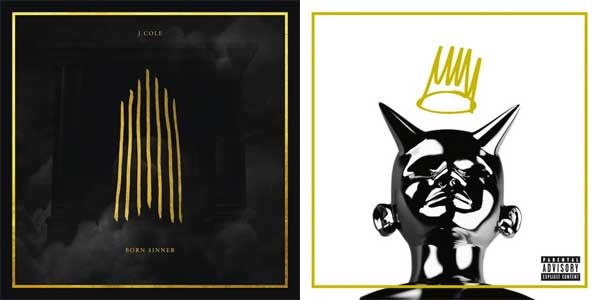
J. Cole certainly seems to be in an enviable position in the current realm of hip-hop. He’s proven on releases like The Warm Up, his outstanding 2006 mixtape, that he has the chops to go bar for lyrical bar with some of the upper echelon rhymers in the game. Furthermore, he’s slated to release a collaborative album with rap’s favorite godson, Kendrick Lamar. And now, he shows that he has the stones to challenge Kanye West by releasing his album (which has a song boldly titled “Runaway” ) on the same day “just to show the boy’s the man now like Wanya”. So it’s not unreasonable to muse that with some good music Cole could rise to be hip-hop’s next obsession; however, despite proclaiming himself the “man,” J. Cole hasn’t really grown up much at all. He’s still rapping about the struggle of being a light skinned rapper and his obsession with fucking everything that smiles at him. Worst of all his music is, as always, so very safe. J. Cole showed the world that he’s capable of being a top tier rapper, but Born Sinner is not the incredible album J. Cole needs. It boasts only a few standout tracks, and while it’s still a better album than Cole World in every way, it has several flaws, the most glaring of which is that it continually taunts us with J. Cole’s obvious talent, but it refuses to ever display it for longer than just a few bars.
The album opens with immediate highlight “Villuminati,” sporting the best real beat on the album: a murky atmosphere layered with sharp drums and a “Juicy” sample. J. Cole “brag[s] like Hov” with some of his most cohesive rhyme schemes and effortless flow to date, and despite some left field homophobia (“Just a little joke to show you how homophobic you are /and who can blame you” ), “Villuminati” comes out as a great start to an album that slowly falls off. Lyrically, J. Cole has stepped his game up in several respects. One of his greatest liabilities in the past was that his rhyme schemes were far too basic to be interesting, and he made up for that by having exciting storytelling (“Lost Ones,” “Dollar and a Dream” ) and lively content in his raps. But on Born Sinner, his lyrics are much the opposite and his content quickly becomes tiresome. Nevertheless, J. Cole weaves his rhymes much more cleverly into his music, working them into quick and fluent flows so that they sound incredible and don’t seem as basic as they really are (the “Rich Niggaz” couplets of “I took a trip down memory lane/ And watching little Jermaine do his thang before he made a name” and “Probably kill for another claim to fame, my brain the same/ Yeah nigga, at least he ain’t insane” are examples of this) It’s these flashes of musical brilliance that give us hope, but they are so few and far between that they can’t make up for some of the poor decisions he makes.
In terms of beat selection, for the most part they are on point. The foggy synths of “Trouble” flow through a grandiose choral sample as Cole again makes the most of his simple rhyme schemes (“Gettin’ to the Promised Land, you don’t want problems, I promise man” ). There are a few missteps in terms of beats: “She Knows,” “Chaining Day,” and “Crooked Smile” – which is the most insipid song on the album (still an empowering message) – are all monotonous beats. But the worst decision J. Cole made was choosing to use the classic Outkast and A Tribe Called Quest beats of “Da Art of Storytellin Pt. I” and “Electric Relaxation”; it’s cool that Jay-Z shelled out for the beats but the fundamental issue with getting these tracks is that Born Sinner isn’t a mixtape; the appeal of spitting over classic beats on a mixtape is evident: you want to showcase your skills and give listeners something that they know as the backdrop for your lyrics, but to use the beats on an official album says that you want your iteration of the song to challenge the original, and J. Cole’s songs are not even close to strong enough to even get in the ring. Essentially, J. Cole’s selection of those beats automatically means that two songs on the album are completely forgettable (furthermore, Kendrick Lamar, who doesn’t even have a verse on “Forbidden Fruit” still resonates thanks to his incredible gift for hooks). Ultimately, Born Sinner is simply a good album; there are a few standout tracks and the desire to recreate Take Care via darker tones and obsession with his sexual conquests becomes tedious after a while, but fortunately, where Cole World had an abundance of daft lines in each song (“I love it when you give me heeeeeeead, I hate it when you give me headaches” ), Born Sinner is tightened up lyrically, and when J. Cole is rapping for real (“Villuminati”, “Rich Niggaz”, “Ain’t That Some Shit”, even “Let Nas Down” despite the theme of the song being corny by nature), he gives us every reason to keep believing in him. Maybe his next album will deliver on the expectations, but Born Sinner isn’t the “real” hip-hop that everyone has been clamoring for; it’s just a great mainstream album that caters to everyone who isn’t going to buy Yeezus.
After Earth Does Not Suck...
17/06/13 19:45 Filed in: Movie Review
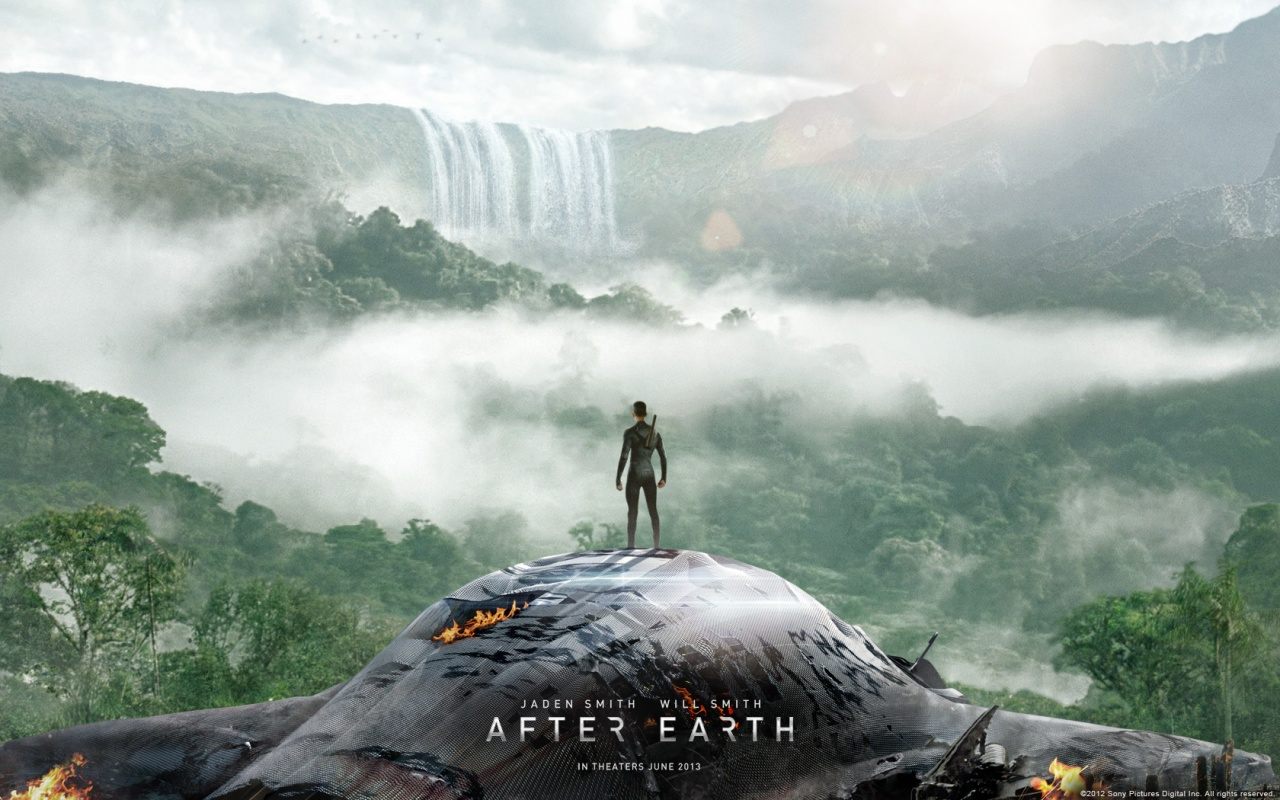
One of the problems with Rottentomatoes is that it's become the lazy man's way of deciding whether to wait for the video release or to shell out the cash for the big screen experience. But sometimes its simple algorithm of consensus is ultimately wrong. If you’re going to After Earth to see a whole lot of whizz bang special effects you will be very disappointed. That’s not at all what this story is about. This is a coming of age story about a young man having to overcome fear. Clearly the studios wanted an Avatar-esque, big summer event film but if they actually read the script they would have easily seen that After Earth even doesn’t pretend to be that. Yes, in the trailer we see a spaceship exploding and crash-landing on a future version of Earth. Yes, it’s starring action hero Will Smith. Yes, there are some cool looking creatures but that’s it. The truth is that M. Knight Shyamalan created a heartfelt story about a stoic father’s relationship with his strong-willed but frightened son. This is a great family film because there’s no gore, nudity, profanity or cheap thrills. It actually carries a spiritual theme about living in the present, making your own choices and not being overcome by your own perceived fears. The problem is that people want to see Will Smith play his Men In Black role and in After Earth he plays an injured soldier named Cypher who only cracks a single joke in the entire film.
In truth the film is more akin to The Pursuit of Happyness…in space. The strength of the narrative is that Cypher doesn’t overshadow the story of his son, Kitai. Despite what Owen Gleiberman suggests, Cypher isn’t an Obi Wan character. He’s much more like Sgt. Al Powell in Die Hard – a guide on the radio. But there are some other truths about this film that make it an important milestone. This is the first time we’ve ever seen a young black male star in a big budget sci-fi film and not get killed in the first five minutes. Not only that – he’s got a father who is a positive role model – and a mother who isn’t angry but supportive. This may not seem important to a lot of people but this is HUGE for young black kids to look up on billboards and see not one but two faces that look like them who aren’t cooning. The only other time we’ve seen this something similar is Karate Kid – also thanks to Will Smith. Kudos to Will and M. Knight for making this happen. Structurally, the story is sound but it’s not about a lot of crazy shock value so you’ve gotta get past that. Where Oblivion was truly a disappointment in its conclusion and plot reveals, After Earth strives to create something that sticks to your bones even without any huge surprises. It’s relatively slow and extremely steady with a cast that all deliver solid though not groundbreaking performances. This film’s weakness comes in its inability to push the boundaries of the genre or of the actors. I’m still waiting for a film to challenge The Matrix in terms of presenting something fresh, new and exciting. Jaden isn’t going to win any awards with this one but he’s believable. This is where the script could have used the wit from someone like Shane Black or Joss Whedon. Instead Shyamalan, Smith and Gary Whitta take his very cautious approach to dialogue, rarely having his characters’ utter words that are truly insightful or passionate although you can sense that the intent is there. In the end, After Earth offers an organic vision of the future with some of the most unique spacecraft designs to date. As with all of Shyamalan’s movies, the craftsmanship is apparent in every frame and there’s meaning under the surface that may take a while longer to resonate with general audiences.
So don’t set expectations low going into After Earth, just don’t expect what the trailer tries to sell. The film does play out like a video game with a distinct goal to reach and a timer for it to be reached but there are some nice moments that would have been much more well received in a time when films like 2001 allowed for sci-fi to be more than just 90 minutes of extended fight sequences and explosions.
Exclusive Interview With "V/H/S" Writer Nick Tecosky
13/06/13 20:56 Filed in: Misc.

I realize “V/H/S2” just came out, but having seen and thoroughly enjoyed both the sequel and the original “V/H/S,” I can honestly say you are unlikely to find anything as disconcerting between the two of them as “Amateur Hour,” which was written by Nick Tecosky and David Brucker. It is no secret that “Amateur Night” is one of the most popular entries from the horror anthology “V/H/S.” Indiewire called it “the standout of the bunch”; “First and best is ‘Amateur Night’ …” boasts Variety; and the Boston Globe states: “ ‘Amateur Night’…is the compilation’s nonpareil.” Equally frightening and revulsive, “Amateur Night” is the first film that has scared me in a long time. In fact, I had that same reaction watching it that I did when I saw the chestbuster scene in “Alien” as a kid: “Who the hell thinks of this stuff!?”
Enter Nicholas Tecosky, co-writer of “Amateur Night” (along with David Bruckner). Nicholas was nice enough to grant an exclusive interview to AllGoodThings.tv to talk about the project.
Q: So how did “Amateur Night” come about - e.g., how did you guys come up with this story? Take it back to the very beginning if you would and tell us how you guys decided on the plot. On the Blu-ray commentary, Bruckner mentions the concept of the male gaze being an inspiration; can you expand on that? I suppose this question also encompasses the mechanics of your writing partnership with Bruckner and how guys crank out a script (e.g., do you alternate writing scenes?)
A: When we were first approached about submitting a story, we did what we usually do, which is to camp out in the office or someone's living room for a few days eating poorly and throwing ideas at each other until something sticks. We'd been interested for a while in the way we interact with media, and how it changes our minds and expectations-- particularly in the area of sexuality. And so we kept coming back to this story about Spring Break culture, and the damaging-- even toxic-- ideals that "reality porn" has instilled on a generation of young men. And the story grew out of that. Once we had the idea solidified, we spent two days grinding out an initial treatment to send out to the producers. It's a touchy subject, and more than a few times we found ourselves stopping and looking at each other, asking if maybe we were pushing it a little too far, if maybe the satire we were trying to layer in was too subtle, if the image of a man's naked body being torn apart was a bit heavy-handed... I guess it's obvious where we landed on that one. And once we were given the go ahead, we got to the real writing.
We tend to do the heaviest lifting during the outlining process. We don't like to write pages until all of the structure problems have been answered. There's nothing worse than getting to the third act of a screenplay and realizing that you have no idea how to tie all of the threads together. At that point, you have to take it back to outlining anyway, so why not do the footwork up front? Once that's done, we tend to split up scenes and work separately, and then passing them back and forth, refining each other's work, until we're both happy with what we've done. "Amateur Night" was a little different for us, in that- once we had a draft of the script and everything was cast- we ended up tossing it aside in rehearsals and instead working with the cast on tightly structured improvisation. Certain lines and salient points were kept in, but we gave the cast a lot of latitude to discover moments on their own. I think that with found footage, it's hard to keep the performances realistic unless the performers are allowed the leeway to explore and spontaneously discover moments. It was daunting as a writer, but ultimately, between our structure and their performance, we came up with something very dynamic.
Q: How much of Lily’s character was already on the page as opposed to being developed subsequent to Hannah Fierman being brought on? For instance, was the line “I like you…” in the original script or was that something that came about later, after Fierman was hired. Other baffling Lily quirks include her crouching down immediately after leaving the club and wanting to perform fellatio on Drew Sawyer’s character after making meatloaf out of his friends. One of the questions I hear repeatedly and I’ll ask you here is: “If [Drew’s character] had reciprocated Lily’s affections, would she have let him live?” (I suppose it's possible she did let him live, although it seems doubtful.)
A: The casting on this was really strange: We had a solid picture of each one of the characters in our heads when we started seeing actors, and in the case of Hannah Fierman, it was sort of like hitting the jackpot. We'd thought that casting the role of Lily was going to be the hardest aspect, and then she walked in and gave us exactly what we were looking for. And then some. And "I like you" was in the original script, but it certainly didn't have the weight on the page that Hannah endowed it with. I think that I was a little scared of her the first time she said it aloud. In other cases of casting-- most notably with Joe Sykes, we were surprised to find that there was a completely different take on the character than the one we'd first imagined. In the original script, his character is described as a sort of creepy, brooding ex-high school football player who'd let himself go, and just skulks around in the shadows. He was a predator. A clear threat. And then Sykes walks in and plays him as this manic, affable guy, and when he leaves, we can't see the character any other way. Joe lends the proceedings a levity that wouldn't have been there had we gone with our original take on Patrick.
As far as our protagonist's fate, we like to think that maybe she brought him back to the nest. Introduced him to mom and dad. Maybe domesticated him. Settled down and had a family. I really do believe that Lily liked him, despite obvious issues with his friends. But I think a lot of relationships work that way.
Q: How did “Amateur Night” come to be selected for “V/H/S” by the producers and how were notes given by them? In the Blu-ray commentary Bruckner said that he was given notes that Fierman’s leap onto Joe Sykes needed to be amped up. Were you guys given notes on the screenplay as well before shooting?
A: This was sort of an atypical experience, in that- once they'd approved of our story- we were given a tremendous amount of freedom in how we executed it. And the whole process moved at such a breakneck pace that most notes weren't given until we were in post. And by that point, many of the notes were about tightening things, and pumping up the tension. We were very lucky to be given that kind of trust to make what we wanted to make.
Q: Tell me a little about your background as a writer, such as prior projects and how you decided on writing as a career. Do you see yourself sticking to the horror genre or are you looking to write other genres?
A: I'd studied theater originally, and out of school, my first job was actually writing children's theater for a large company that owns theme parks across the nation. So for years, I was writing about finding the true meaning of Christmas, adapting fairy tales for a very young audience. In the meantime, I was spending nights adapting William S. Burroughs pieces to stage or writing horror with Bruckner. Looking back, it felt a bit like living a double life, but when it comes down to it, there's a surprisingly thin line between children's theater and horror. It's all couched in the fantastic. In a world that exists just beyond the border of our mundane lives. I grew up reading fantasy and horror, and always had a strong desire to see that world. I knew it was there, if I looked hard enough or did the right things. As I got older, I realized that maybe I had to make that world for myself.
But I enjoy writing horror. It's an excellent way to explore the very real anxiety we feel about our lives and the world we move around in. We live in troubling times. Everyone's nervous about the future. Or maybe I'm just really neurotic. Maybe everything's okay. I don't know.
Q: Bruckner notes in the Blu-ray commentary that you guys had an entire backstory worked out for Lily. (He also said that it was something you guys plan to never reveal.) That said, is it possible to get a little more about her origins? I’m sure lots of fans would like to know what type of creature you had in mind – I see succubus bandied around a lot on the net.
A: We did work out a backstory for her, though it was done mostly so that we would understand fully what we were working with. We never saw her as an evil creature. There is a real tenderness there. In order to really have that play naturally, you've got to have context. We worked with the idea of the foreign exchange student, or the anthropologist coming to study a culture alien to them and getting too close. We did, obviously, look at the succubus as something of a model-- we named her Lily, after all. As for the specific details of where she came from, I'll leave that up to the audience's imagination. I really do believe that the more information given about your antagonist, the more you demystify her, the less scary she is. That's why the first season of American Horror Story stops being scary after a few episodes, and just ends up being a particularly engaging soap opera about dead people.
If anybody absolutely, desperately needs to know Lily's backstory, find me and get me drunk. I'm a talker when I've had a few.

A: The Haunting (the original version) is one of the coolest haunted house films out there. It's a great character study, and considering that you never actually see the specter that wanders the place, or have any idea of what it wants, builds tension incredibly. The scene wherein Julie Harris wakes up to her roommate too tightly squeezing her hand unnerved the shit out of me the first time I saw it. And on top of that, it's just a beautiful old film, and shows how much a simple story with minimal effects can shake an audience. The remake went in the other direction. You couldn't go three minutes without some statue jumping out and trying to murder somebody. It sort of killed the magic of the original.
I'm also a fan of Roman Polanski's Repulsion, which is a great story about madness in a girl marginalized by everyone around her. She's beautiful and quiet and strange, and people simply imprint on her what they need of her. And then, she snaps, and it is horrible and unsettling, and despite the fact that she is becoming violent, you spend the entire film rooting for her anyway. I've watched this one a lot, and can't help feeling gross every time.
And I only recently saw Inside, the French stalker film that was maybe the hardest thing I've ever sat through. It is bloody and visceral from the first scene and really doesn't let up for more than a few minutes after that. And Beatrice Dalle is one of the most terrifying antagonists I've seen-- largely because she is so singlemindedly obsessed with attaining her goal. And the directors do a brilliant thing with her: They practically force you to empathize with her after she's brutally murdered people. It's very troubling. I had a little bit of a panic attack watching it. Though the same thing happened to me watching Melancholia, and that wasn't horror, just a sort of existential dread.
Q: What’s next for you project wise? Is there anything you would really like to do, like write an episode of The Walking Dead season 3?
A: I'm working on a couple of stories right now- one is actually a pilot for a series about people being forced into untenable situations and having to do horrible things to survive in the current economy. I'd like to think of it as a comedy. And I run a monthly show and companion podcast called WRITE CLUB Atlanta, wherein we take local writers and pair them up with opposing topics and then make them battle it out in front of a live audience. It's a loud, drunken time, and has been surprisingly successful. People like watching conflict play out in front of them. It's satisfying to watch. And yeah, I'd love to get a gig on something like the Walking Dead. It's shot here in Atlanta, and many of my friends get to go to work on it in various capacities. One of my good friends is a stuntman and a regular on the series, though you'd never recognize him under the make-up. He's been shot in the head on every other episode.
It's a living.
--> Artwork by Carol Seleme… See the image come to life here
A Few Thoughts on "Man of Steel" - It's Good
12/06/13 00:17 Filed in: Movie Review
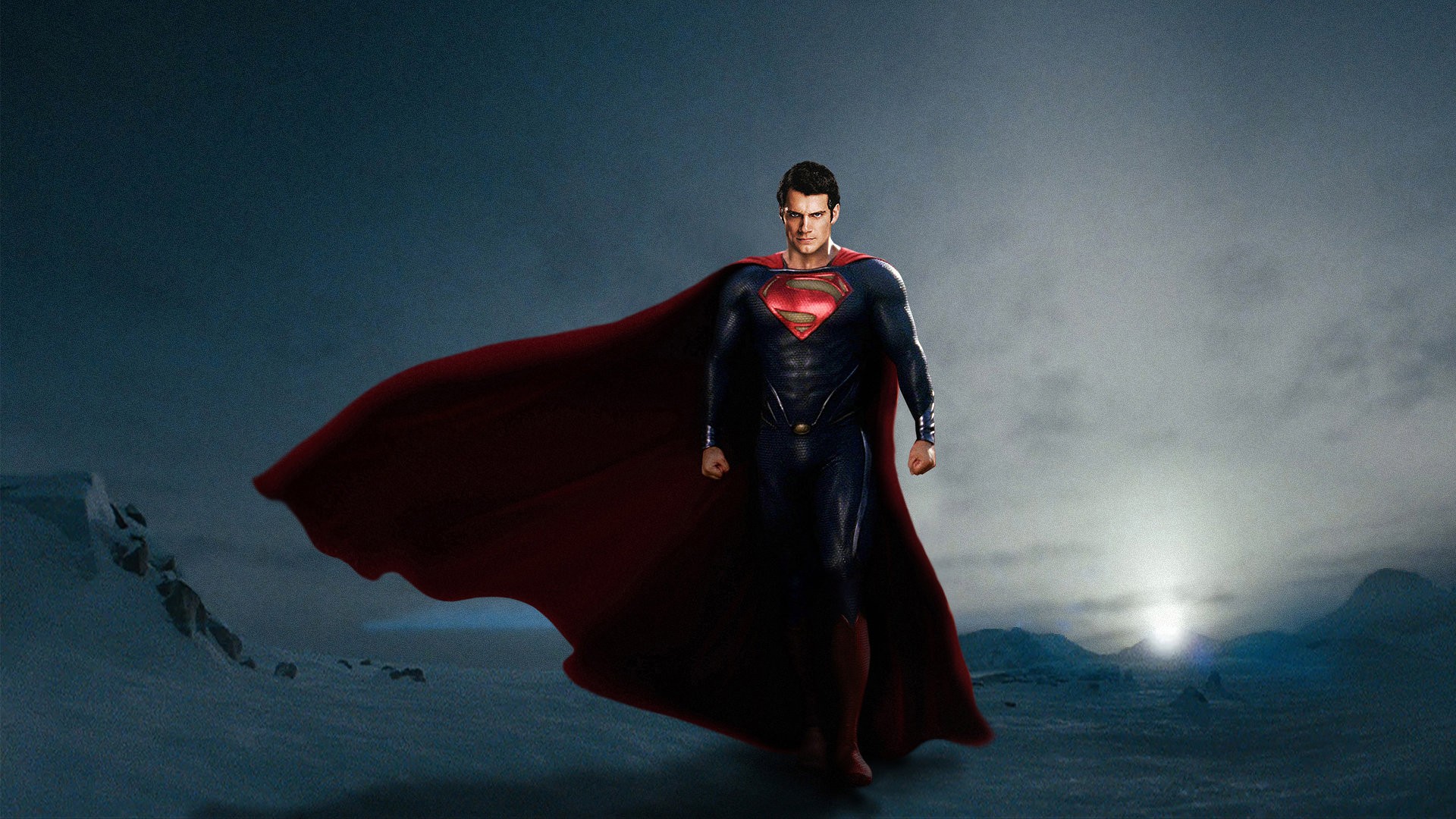
I just walked out of a 7 pm showing of “Man of Steel” and I have to say I was impressed. You really can’t trust critics or Rotten Tomatoes all the time to give movies a fair evaluation. Maybe Zack Snyder is still trying to live down “Sucker Punch,” or maybe due to its previous problematic filmic adaptations, “Superman” is viewed with a skeptical eye from the start. But the fact is, this was an exceptionally well made film with some great performances, including the notably restrained Henry Cavill.
The story is based roughly on the 2006 DC Comics General Zod arc. Zod is a warrior Kryptonion whose sole purpose is to protect their race. Surprisingly, Zod and Jor-El, Superman’s father, played with incredible charisma by Russell Crowe, see eye to on the problematic aspects of Kyrpton’s oppressive government. They just don’t agree on how to fix it. Zod wants to destroy the current regime and start from scratch. For that he needs genetic code for the race, which Jor-El has cleverly hidden with his son, who he sends to earth right before Krypton is destroyed in a jaw dropping opening sequence.
Once on earth, we start with Superman as an adult and his backstory is told via flashbacks, which gets us to the action faster. Some of it is standard Superman-saves-the-day sort action, but it is very well shot and choreographed by Snyder. And the story about Superman’s relationship with his earth father (another excellent casting choice in Kevin Costner), who does not believe society is ready for him to reveal his true identity, reaches a fantastic and awe inspiring denouement. Within 30 minutes of watching this film I knew it was well worth the price of admission. The movie could have used some trimming, yes, but there are so many things that are right with this movie, this complaint is trivial by comparison. So let’s mention some of the rights.
1. Superman is actually believable as an alien-in-human-guise with other worldly strengths. It’s through a combination of Cavill’s physical build, amazing special effects and excellent direction that this feat is achieved, but I haven’t been this convinced of the physical capabilities of a super hero in a long while.
2. Casting is superb. From Cavill’s notable and well utilized reserve to Michael Shannon as Zod to Fishburne as the hot head chief of the Daily Planet, just about every role is spot on. Amy Adams looks great, as usual, and is appealing, but hers is the only role that seemed fungible.
3. Music - Hans Zimmer is a great composer and he soars on this soundtrack. You will be going to iTunes later to look up some of these tracks.
More than anything, I just felt “Man of Steel” was a very good movie going experience. Don’t listen to the critics on this one. The audience applauded at the end - that should tell you something. (The movie is already headed toward a $100 million box office opening weekend.)

